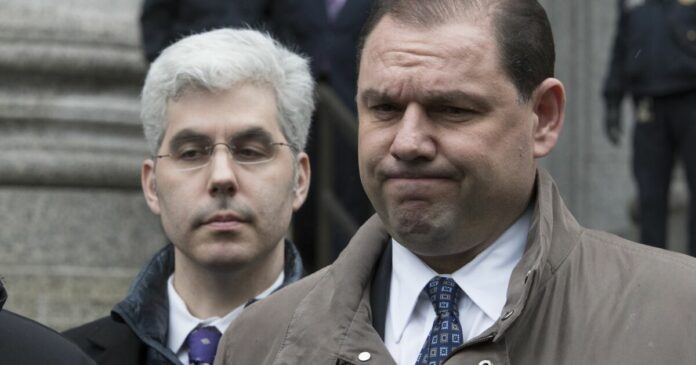The Supreme Court recently reversed the conviction of a onetime aide and campaign manager for disgraced former New York Gov. Andrew Cuomo. The decision may have surprised those who follow Albany’s culture of corruption, but it was thoroughly in keeping with the recent history of the Supreme Court. The Roberts court has been busy deregulating corruption for over a decade.
The court’s own ethics have come under renewed scrutiny lately thanks to revelations about Justice Clarence Thomas, among others. What’s less widely appreciated is the court’s accumulating record of making political corruption easier to engage in and harder to prosecute.
The corruption conviction of Joseph Percoco did not exactly come out of left field. Cuomo had to resign from office in ignominy after he was credibly accused of a long pattern of sexual harassment, and he didn’t enjoy a sterling reputation beforehand. In 2014, he made the not-suspicious-at-all decision to disband a commission that was investigating corruption in the state around the time it started getting too close to his friends.
While eulogizing his father, the late Gov. Mario Cuomo, Andrew Cuomo referred to Percoco as a brother; the New York press referred to him as his enforcer. His official title in 2014 and 2015, around the time the Moreland Commission was looking into New York corruption, was executive deputy secretary to the governor.
In 2018, a jury of Percoco’s peers convicted him of accepting $287,000 in bribes in exchange for helping an energy company get government business. Emails between Percoco and a consultant referred to the money as “ziti,” aping a trope from “The Sopranos.” U.S. District Court Judge Valerie Caproni said she hoped Percoco’s six-year sentence would be “heard in Albany.”
Political corruption is a bipartisan, nationwide problem. Unfortunately, the Supreme Court under Chief Justice John G. Roberts Jr. has been legalizing corruption in cases involving both campaign finance and white-collar crime well beyond the Percoco case.
This has been a big change. Under Roberts’ predecessor as chief justice, William H. Rehnquist, the Supreme Court routinely upheld reasonable campaign finance rules as a means of preventing corruption. And the Rehnquist court had a broad definition of corruption that encompassed rich donors’ power to “call the tune” for elected officials.
The Roberts court has taken a decidedly different tack in cases such as McCutcheon vs. Federal Election Commission (2014), which undid some campaign contribution limits for individuals. Suddenly, wealthy contributors’ extraordinary access to elected officials was to be expected; it was no longer regarded as a facet of corrosive and potentially corrupt relationships between the donor class and elected officials.
In Davis vs. Federal Election Commission (2007), in fact, Justice Samuel A. Alito Jr. asserted that campaign finance laws discriminate against the rich. This upside-down way of looking at the world showed up in a string of cases culminating in Citizens United, which allows corporations to spend an unlimited amount of money on American elections. The Supreme Court no longer acknowledges that corporate political spending could possibly corrupt candidates.
The Roberts court has also become the corrupt defendant’s best friend in a series of cases involving white-collar crimes.
In Skilling vs. United States (2010), for example, the court dramatically narrowed the definition of honest services fraud, a federal crime that has been crucial to prosecuting corruption. Jeffrey Skilling, the notorious crook who ran Enron, got 10 years knocked off his prison sentence as a result.
In McDonnell vs. United States (2016), the court rescued former Virginia Gov. Bob McDonnell from the hoosegow even though he took or borrowed money, clothes, a Rolex and a Ferrari, among other gifts, from a donor. And in Kelly vs. United States, the court spared the aides behind former New Jersey Gov. Chris Christie’s Bridgegate scandal the prison term a jury thought they richly deserved.
These opinions have ranged from narrow majorities to unanimity, but one of the most consistent votes for deregulating corruption has been Thomas. He not only thinks most anticorruption laws are unconstitutional; he has also maintained the view, extreme even for the Roberts court, that mere disclosure of the sources of money in politics somehow violates the 1st Amendment.
The recent revelations that a wealthy Republican donor gave Thomas, his wife, his mother and his grandnephew a host of valuable gifts further illuminates the justice’s zest for undisclosed relationships between the rich and those in power. And the entire court has effectively rebuffed any attempt at oversight, issuing a defiant response to Senate Judiciary Committee Chairman Dick Durbin’s recent request that Roberts answer questions about the court’s ethics.
In the New York case, meanwhile, the justices relied on the fine distinction that most of Percoco’s malfeasance occurred during a brief interregnum between stints in state government, while he was working on Cuomo’s reelection campaign as a technically private citizen. The court wrote that “the intangible right of honest services … plainly does not extend a duty to the public to all private persons.”
With the next presidential contest gearing up, the Percoco ruling could further embolden unscrupulous campaign managers and aides. After all, the front-runner for the Republican nomination has already seen two former top campaign officials, Paul Manafort and Steve Bannon, charged with federal crimes — and pardoned both of them. The Roberts court’s continuing campaign to excuse corruption by other means is bad for our democracy.
Ciara Torres-Spelliscy is a Brennan Center fellow and law professor at the Stetson University College of Law. She is the author of “Political Brands” and the forthcoming “The Democracy Litmus Test,” about political corruption.


